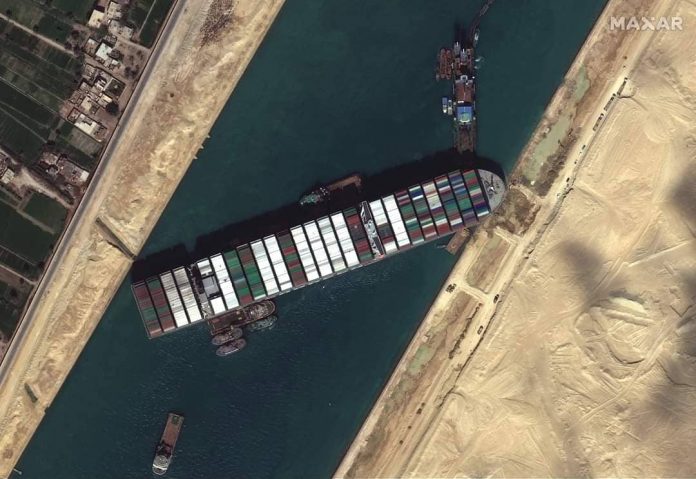
Maersk Line has reached an out-of-court settlement with the parties it sued for damages resulting from the grounding of Ever Given in the Suez Canal two years ago.
The 20,124 TEU Ever Given, owned by Japanese tonnage provider Shoei Kisen Kaisha and on long-term charter to Taiwanese mainline operator Evergreen Marine Corporation, became grounded on 23 March 2021, soon after crossing the southern entrance to the Suez Canal. It turned out that the canal’s width was shorter than the length of Ever Given, resulting in the bow and stern of the ship stuck in each bank.
The incident cut off the waterway to all shipping, affecting up to 400 vessels during the six days that the canal was closed. Affected vessels included 50 container ships.
To refloat the Ever Given, the Shoei Kisen engaged SMIT Salvage for the complex operation.
Approximately 30,000 cubic metres of sand was dredged to help free Ever Given and 11 harbour tugs and two seagoing tugs were deployed.
On 29 March, the distressed ship was refloated.
Early this year, Maersk sued Shoei Kisen and Evergreen at Denmark’s Maritime and Commercial Court for damages from the disruption. Evergreen responded that it could not be held liable as it was merely the charterer of the ship, with Shoei Kisen responsible for the technical management.
Container News reached out to Maersk for comment but did not get a response. Bloomberg reported that the Danish shipping giant confirmed that the matter was resolved out of court, but did not say more. Danish media reported that Maersk sought US$40 million in its suit.
Shortly after the Ever Given was re-floated, a dispute also arose as to whether a binding contract had been concluded between the SMIT and the ship’s registered owners, Luster Maritime SA and Higaki Sangyo Kaisha, both subsidiaries of Shoei Kisen Kaisha.
SMIT asserted that as no binding contract was signed with Luster and Higaki, it could claim salvage under the International Convention on Salvage 1989 (the ‘Convention’) and/or at common law.
E-mail exchanges between representatives of SMIT and Luster’s and Higaki’s claims handler were submitted as evidence that both sides had agreed on remuneration for the Dutch company. However, no binding contract was inked at the time.
Earlier this year, a London court ruled in favour of SMIT.
Martina Li
Asia Correspondent
Container News
 Hotline: 0944 284 082
Hotline: 0944 284 082
 Email:
Email: 


 VN
VN